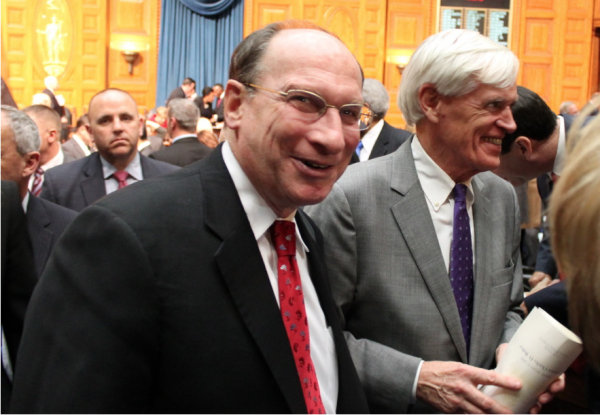September 23, 2020

Chief Justice Ralpg Gants, at left. State House News Service photo
Easing punishment for those convicted for possession of drugs has not been the most popular cause for public officials to take on. Yes, activists and community groups have taken it on, but it’s a very uphill climb to persuade state legislators and governors, who most fear the charge that they are “soft on crime.”
Here in Massachusetts, the unlikely but real champion in the fight to repeal long mandatory minimum sentences was SJC Chief Justice Ralph Gants, who died last week at age 65 after a brief illness. I was there at a packed State House hearing on June 9, 2015, when Gants got up and said this — and more:
“There are at least three reasons why the Legislature needs to abolish mandatory minimum sentences: racial justice, justice reinvestment, and fairness in sentencing. Let me begin with racial justice: mandatory minimum sentences have a disparate impact on persons of color.
“I can spare you a thousand words by turning your attention to Exhibit 1. That chart shows that in 2013, 44 percent of all persons convicted of drug offenses were persons of color, but 75 percent of all persons convicted of drug offenses with mandatory minimum sentences were persons of color. This remarkable 31 percent differential is not a one-year phenomenon; it is the same differential as in 2002.
“And the differential during this twelve-year period never fell below 20 percent. Given the durability of this racially disparate treatment over time, there is no reason to believe that the past will not be prologue. If you do not abolish minimum mandatory sentences for drug offenses, you must accept the tragic fact that this disparate treatment of persons of color will be allowed to continue.”
One of the mandatory minimum laws targeted for reform meant that anyone convicted of selling drugs within 1,000 feet of a school would receive a long sentence. It may have been reasonable to penalize those selling drugs to teens, but this law also covered any sales to adults near a school, even sales at midnight when no youth were around or that took place 6 blocks or a 1,000 feet from a school. This was the “War on Drugs.”
The biggest driver of mass incarceration were these long mandatory minimum sentences on drug charges. And the disproportionate sufferers of these sentences— as Gants said— were people of color.
Gants was immediately attacked for his testimony by almost all the district attorneys in the state. They continued making their case for why mandatory minimums should be kept in place. And they kept on attacking Gants in the media. To his credit, the chief justice kept speaking out on this despite the attacks.
I am an organizer in a group called Massachusetts Communities Action Network and we were one of the Steering Committee members of the Jobs Not Jails Coalition that took on this criminal justice reform campaign. We put Justice Gants’s statement on fliers, fact sheets, letters to legislators, and quoted them in meetings with legislators. They may not have believed us. But it was very hard to disregard a chief justice, let alone one who had the data to back it up.
As the result of our campaign, five of these laws assigning mandatory minimums on different drugs were repealed. It meant fewer people went to prison for a long a time and it meant more people ended up getting referred to treatment instead of prison. And it was a measure of racial justice.
Last month, Chief Justice Gants convened a wide variety of stakeholders to deal with the possible tens of thousands of eviction cases that would flood the courts if the state’s moratorium ends — as scheduled—on Oct. 17. This month, Harvard Law School released a massive report on racial disparities in sentencing in the court system that Justice Gants had asked them to do.
I’ve been working for 50 years as a community organizer in Massachusetts, but I have never seen a chief justice step out of his lane to prophetically challenge such injustices. The very powerful— and he was a powerful person — just don’t take such risks very often.
So, we will miss him a lot. I humbly ask other powerful politicians and corporate leaders to take a moment to think about risks they can take to change the story when we have so many people hurting with lives of pain and despair.
Lew Finfer is a Dorchester resident and a longtime community organizer.



